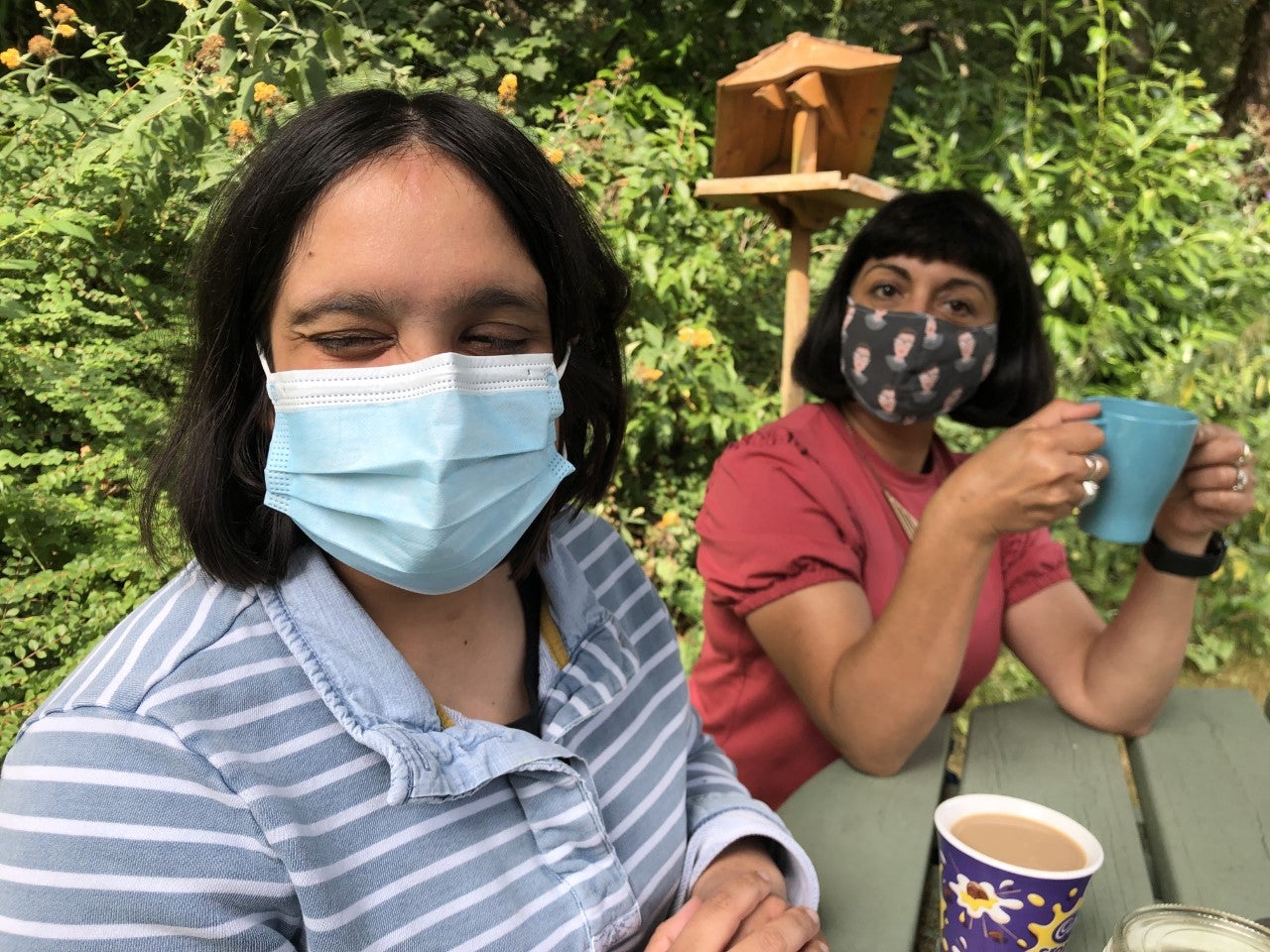My mask is staying on – despite Boris Johnson’s disregard for the vulnerable
The sudden lifting of restrictions to benefit the majority limits options for the minority. Extra protections are needed for a little longer to protect the people most at risk


One person’s restriction is another’s protection. So as the sibling of someone who has a learning disability, I will keep wearing a mask. Boris Johnson’s decision to ditch masks shows blatant disregard for people with learning disabilities like my sister Raana.
People with learning disabilities are eight times more likely to die from Covid, according to a 2021 study by the London School of Hygiene and Tropical Medicine, Oxford University and Public Health England, and my sister’s ethnicity puts her at an even greater risk. In fact, Covid has intensified the inequalities already faced by the UK’s 1.5 million people with a learning disability. Even before the pandemic, this group of people were far more likely to die younger than the rest of the population.
Raana relies on face-to-face contact, she does not use the phone, so the lockdowns sent her anxiety soaring. But she knows that wearing masks and social distancing helps keep her safe. So for almost two years, we have been meeting Raana in the garden of her supported living home. If we meet inside, we wear masks and keep rooms well-ventilated. Initially, Raana was so unsettled by all this that she insisted on wearing not just a mask but gloves, a cap pulled down to her nose and a coat zipped up to her chin. I would have found this funny had it not been such a heartbreaking reflection of her anxiety.
We have continued being cautious even after Raana was finally vaccinated (people with learning disabilities were initially not a priority for vaccination, despite their higher risk) because being vaccinated does not stop you getting Covid.
To minimise the risk to Raana, I avoided going out before Christmas and steered clear of those still mixing indoors. It seemed odd to friends who enjoyed a more normal festive season compared to last year, but my family Christmas was spent in the garden. It was inconvenient but also a temporary and low-risk option.
Such mitigations also make sense given some autistic people and people with learning disabilities are still unvaccinated, according to research by Professor Chris Hatton of Manchester Metropolitan University. Some people cannot get the support they need for their acute needle phobias and there are others who are yet to have booster jabs.
The removal of restrictions threatens aspects of Raana’s life that had started returning to normal. With masks gone and Omicron still raging (government data shows 107,000 people recently tested positive on a single day), she will not feel confident enough to do her shopping, go to the gym or volunteer in the cafe run by the charity that supports her.
The sudden lifting of restrictions to benefit the majority simply limits options for the minority. This is proved by the findings of the Coronavirus and learning disabilities study funded by UK Research and Innovation. It shows that the lifting of last summer’s restrictions made life more restricted for learning disabled people. More than half the 500 people surveyed still worried about leaving the house. Only one in 10 said their lives had returned to normal.
The charity Sibs, which helps disabled people’s siblings and which I chair, recently launched a project to support those still living cautiously to keep their brothers or sisters safe.
Louise Gascoine is worried about her brother who has a learning disability, complex health needs and is clinically extremely vulnerable. Gascoine, who is clinically extremely vulnerable herself, says: “I feel so very sad and angry about how removing restrictions places more limits on my brother – limits on where he can go, who he can see, on doing the things that bring him joy. All of these restrictions being suddenly lifted when we’ve shielded him for the entirety of the pandemic, it just doesn’t feel safe to emerge from shielding at all.”
Gascoine, who lives in the northeast of England, says she will continue to wear a mask and avoid indoor spaces outside of home: “I long for the day my brother and I can return to doing the things we love, but so many people are being sucked in by the narrative of ‘everything is okay’, I’m left wondering what kind of life outside of shielding we’ll ever go back to.”
Natasha Fenwick, from Hampshire, has similar concerns for her learning disabled and clinically extremely vulnerable sister: “My sister lives in a care home and has been shielding for the last two years. In recent months she has finally been able to go out twice a week, to two specific, controlled places, but a return to normal activities is still a long way off for her. Without masks and other protections, I’m worried this will be prolonged even further, and I’m concerned about the effect on her mental wellbeing.”
We will continue to wear masks but this does not make us killjoys, cowards or opponents of liberty. We simply understand extra protections are needed for a little longer in the interests of people most at risk from Covid.
The decision to get rid of masks without a scrap of acknowledgement for the impact on disabled or clinically vulnerable people does not consider those who need the most support. In this government’s haste to embrace “living with the virus”, people who are already the least visible will be further excluded.
Join our commenting forum
Join thought-provoking conversations, follow other Independent readers and see their replies
Comments
Bookmark popover
Removed from bookmarks